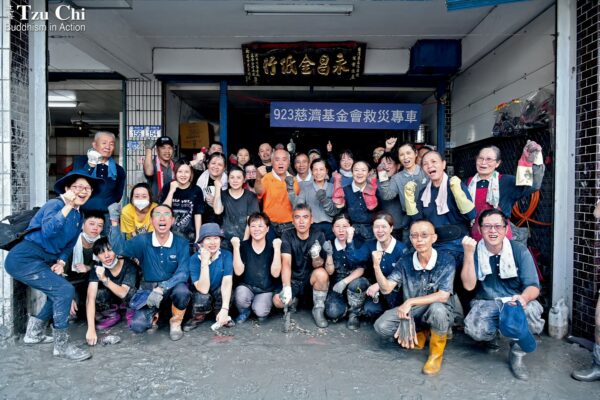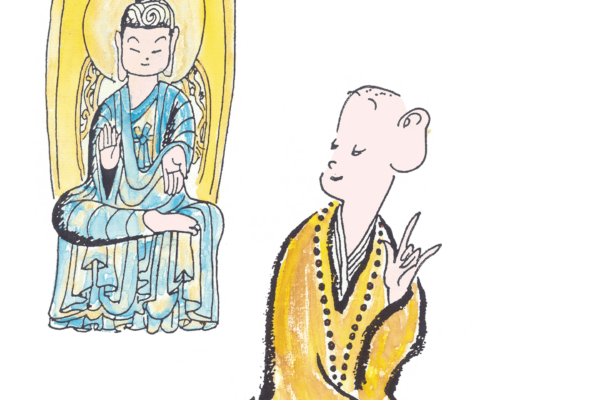By Huang Xiao-zhe and Cai Yu-xuan
Translated by Wu Hsiao-ting
Photos by Huang Xiao-zhe
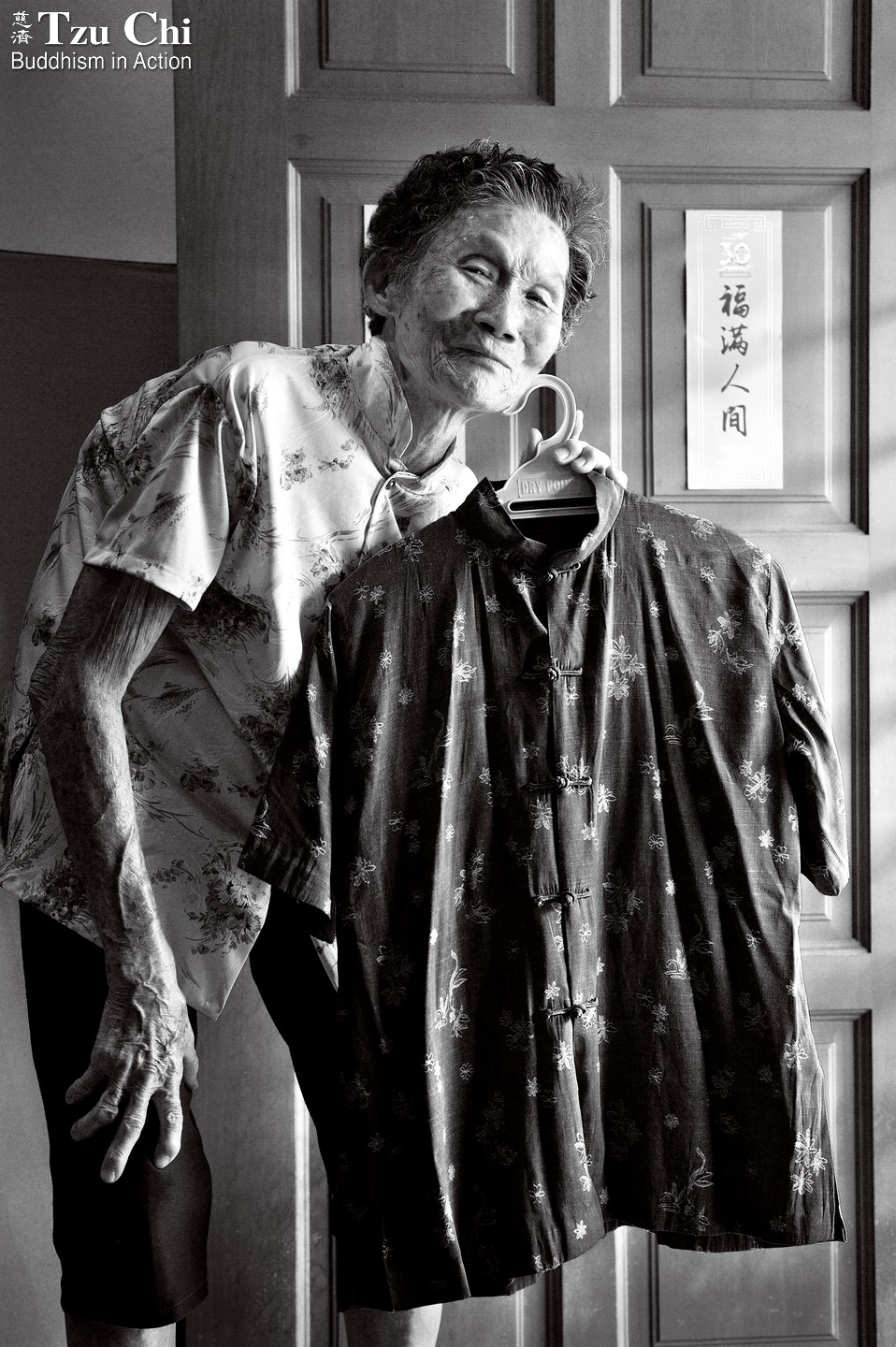
There are over 13,000 Tzu Chi recycling volunteers in Malaysia, spread across more than a thousand recycling stations. Everyone willingly pitches in to do the unpaid work, no matter their educational level or socioeconomic standing. By reclaiming reusable garbage, they hope to inspire everyone to conserve and cherish the Earth’s resources so that a better, cleaner Earth can be left behind for our posterity. In this article, we feature recycling volunteer Tan Wee. Despite being 87 and afflicted with a severely stooped posture, she works hard at recycling with a persistent spirit worthy of everyone’s admiration. Though severely stooped, she stands tall for the Earth.
As a photojournalist for Tzu Chi Monthly, I’ve interviewed and covered many Tzu Chi recycling volunteers in Taiwan. That’s why I was very excited to meet their counterparts in Malaysia during a recent trip to that country. One of the people I met was Tan Wee (陳為), a resident of the Gombak District in the western Malaysian state of Selangor. I warmed to her immediately because she spoke a very familiar language—Hokkien, a Chinese dialect widely spoken in Taiwan and often referred to as Taiwanese. Tan is 87 and badly hunchbacked. Her severe stoop is a result of a traffic accident at age 46. The accident left her with a curvature in her spine, which increasingly deteriorated with age. But despite her severe impairment, she never complains or laments. On the contrary, she makes the best of her time by giving of herself—and her way of giving is to work at recycling every day. Taking Master Cheng Yen’s words to heart, she does her best to do the Earth a good turn.
Tan wears traditional Chinese clothes, looking dignified and spirited in them. “I make every single one of these garments myself,” she said proudly. She is good with her hands and makes her clothes to suit her slouched figure. Admiring her skills, I asked her to pose with one of her garments for me to photograph. She smiled cheerfully into my camera as I snapped photos of her. She looks radiant in the photos, as if she were saying: “I’ve never allowed the deformity in my body to hold me back. I know how to make clothes for myself to make me look good. My stooped back has never stopped me from giving either. It has never been an impediment to my serving as a recycling volunteer.”
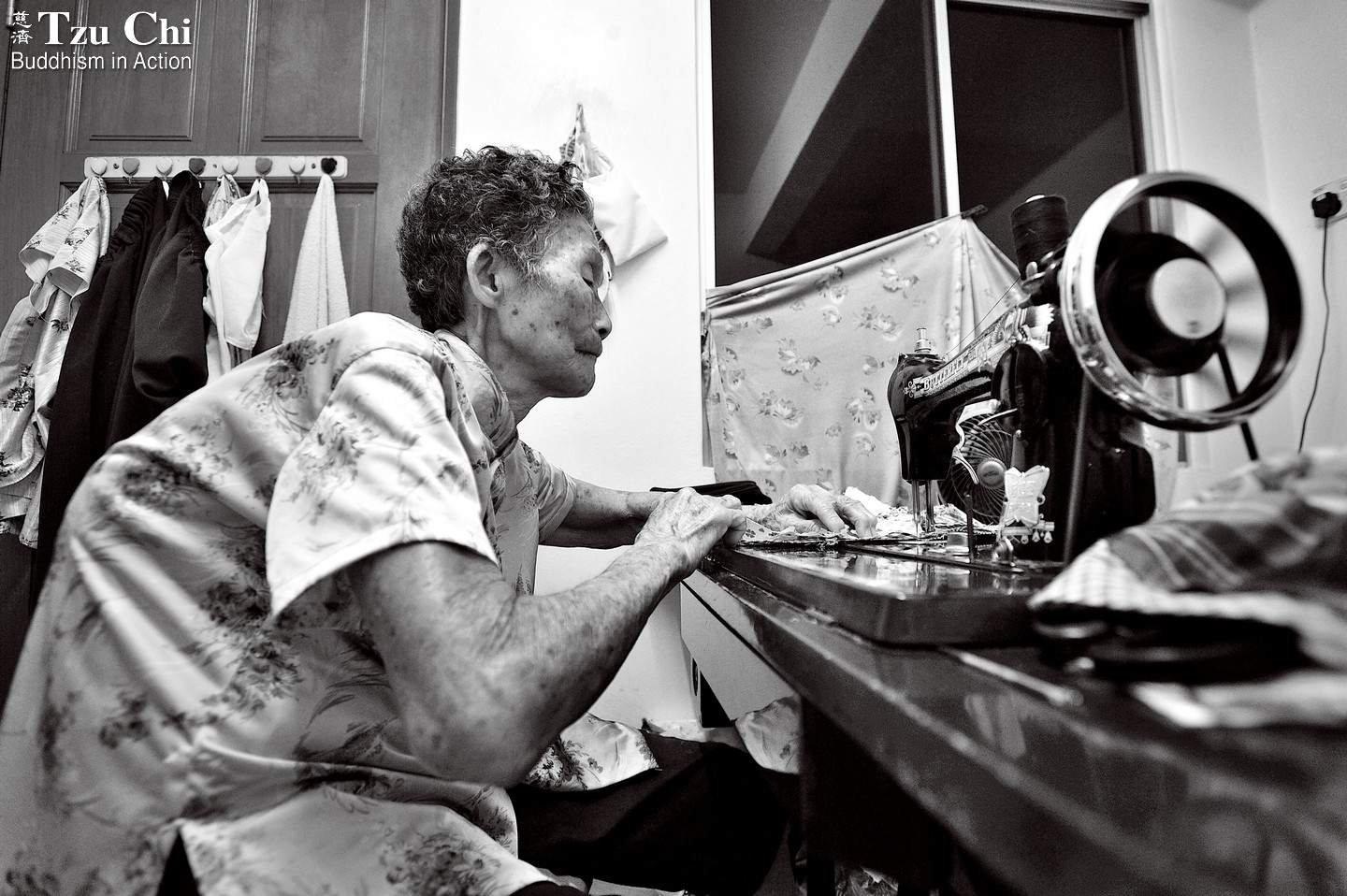
A hard life
Tan sat at a sewing machine, her feet pumping the treadle as her hands pushed the edges of aligned fabric under the needle. The sound of the machine echoing in the room transported me back in time to her childhood. She told me that as a child she enjoyed watching her mother work at a sewing machine—that’s how she picked up her sewing skills. She was using those skills to help with her family’s finances by the age of ten, helping her parents out when they were out working in a kitchen garden. At 13, she took up work as a rubber tapper, going from plantation to plantation to cut into rubber trees and collect the latex oozing from the incisions. Later, she married and bore six children, but her husband was irresponsible and liked to gamble, and he passed away early. The heavy burden of supporting six children fell to her. She did what she could to provide for them: She cleaned houses, cooked, and washed clothes for others. Even though caring for her children after long days of work was hard, she sometimes made clothes too to supplement her income. Making ends meet was a challenge, and she had to pinch every penny. The family’s clothes were repeatedly patched up to save money.
Her life at the time wasn’t easy, but she bore her hardships with fortitude and resilience. Her hunched back seemed to tell a tale of a lifetime of heavy burdens. Happily, that was all in the past. Surrounded by her children and grandchildren now, her life is one of contentment and peace.
Staying the course
Tan said that her appearance might lead people to think otherwise, but her deformity hasn’t decreased her usefulness. In fact, she can do as much work as others, if not more. After working hard most of her life to support her family, she refused a well-deserved life of ease and comfort in her old age. Instead, she threw herself into recycling work in response to Master Cheng Yen’s appeal to love the Earth through action.
Dawn had barely broken when Tan, carrying a large bag, stepped out of her home, ready to start her daily trip to collect recyclables in the neighborhood. I followed her as she traversed the streets and alleys on foot, her back bent at an angle of nearly 90 degrees. She walked no slower than I did, all the while breathing easily, even though I’m younger by several decades.
“Do you have recyclables for me today?” “Do you still want these glass bottles?” “Anything for me?” She asked local residents as she visited household after household. Whether people had recyclables for her or not, she smiled at them and said, “Thank you. Thank you.”
She took every step firmly and steadfastly, unhampered by her physical limitations, and she went about her business fully at ease. She knew she was walking on the right path and that all she needed to do was to stay the course.
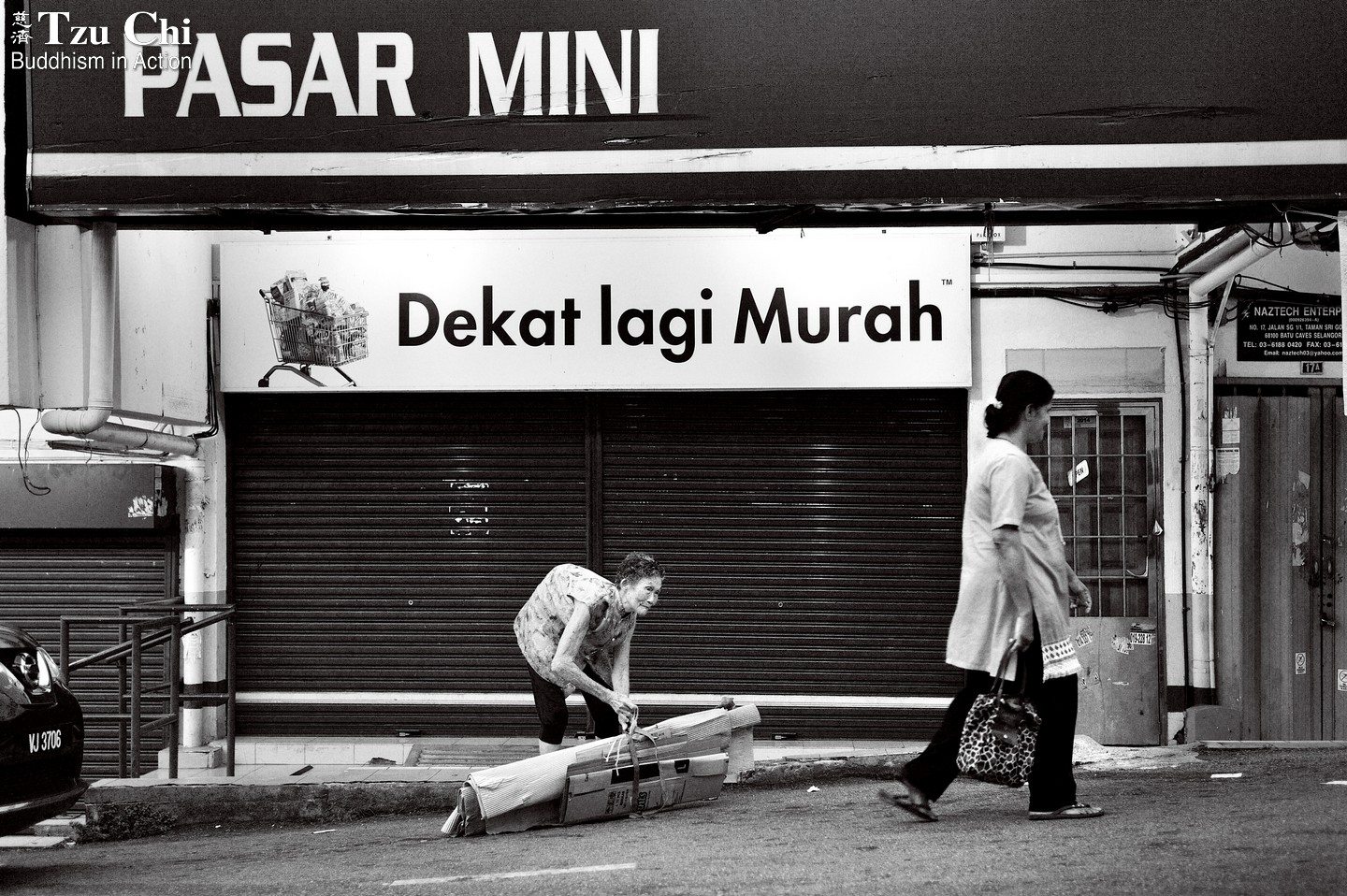
Undaunted by heavy work
Tan went from household to household on her collection trip, knowing like the back of her hand where to stop and in which corner there would be recyclable garbage waiting for her. She has worked in this district for years, and people are used to seeing her around. Whether Chinese or Malay, many save their recyclable garbage for her and take it out to her when they see her coming. Others put their recycling in a fixed corner for Tan to take away.
I grew curious as I saw how she worked. She was on her own, with no one to help her carry stuff. She didn’t even have a hand truck or a cart. How then did she cope when there was a large amount of recycling or when the weight was too much for her to handle? That question was answered later during the trip, when I learned that she would patiently take her recycling home in installments or on repeated trips. When the garbage was heavy, she would, using all the strength she had, drag it a few meters at a time, stop to take a breath, and then continue on. She’d keep this up until she had gotten all the stuff home.
She didn’t rest once she got home, but immediately went on to sort the garbage she had collected. She even washed soiled items. Then she put everything in order, grouping the recyclables by type and preparing them for other volunteers to haul away by truck. Her meticulous approach showed that she’s the type of person who would rather do more herself than add to others’ trouble and leave loose ends for them to tie up. She knows that if she does more herself, she makes the work easier for others. She exemplifies a spirit of service and consideration for others.
Different places, same spirit
When I had finished covering her story and was taking leave of her the next day, I saw her discreetly giving money to volunteer Ong Hok Ki (王國開), who had come to pick me up. It turned out that she was hoping that Ong would treat me to some tea. She felt that she hadn’t been a good enough host to me, especially as I had come all the way from Taiwan. I was very grateful to her when I witnessed this display of thoughtfulness. She was treating me like a grandson. A Chinese saying goes: “A person’s appearance reflects what is in their heart.” This is definitely true in Tan’s case. She has a good heart, and it shines through. She’s not only a loving mother to her children—she is also polite and kind to others. People can’t help but like her.
The warmth and friendliness of the people in Selangor, Malaysia, warmed my heart and made me feel at home. If not for the signs written in Malay and the sounds of prayer wafting from a mosque, I wouldn’t have known I was in a foreign country. I asked myself if there were any differences between Tzu Chi recycling volunteers in Taiwan and Malaysia, and I concluded that they are intrinsically the same. More than 3,000 kilometers (1,865 miles) from Taiwan, there are more volunteers who love the Earth as mothers love their children, who demonstrate their love for the environment by rolling up their sleeves to collect and sort recyclables. Though what each of them can do is limited, they persist at their work, day in and day out. They persevere in their commitment for the good of the Earth. That spirit of unwavering dedication is what moves me the most.

